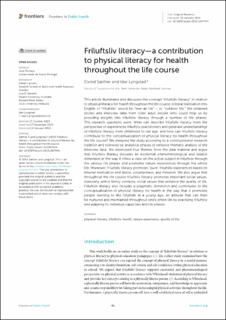| dc.contributor.author | Sæther, Eivind | |
| dc.contributor.author | Lyngstad, Idar | |
| dc.date.accessioned | 2024-04-05T10:40:51Z | |
| dc.date.available | 2024-04-05T10:40:51Z | |
| dc.date.created | 2024-01-10T15:45:20Z | |
| dc.date.issued | 2024 | |
| dc.identifier.citation | Sæther, E. & Lyngstad, I. (2024). Friluftsliv literacy - a contribution to physical literacy for health throughout the life course. Frontiers in Public Health, 11: 1307444. doi: | en_US |
| dc.identifier.issn | 2296-2565 | |
| dc.identifier.uri | https://hdl.handle.net/11250/3125054 | |
| dc.description.abstract | This article illuminates and discusses the concept “friluftsliv literacy” in relation to physical literacy for health throughout the life course. A literal translation into English of “friluftsliv” would be “free-air life” – or “outdoor life.” We obtained stories and interview data from older adult people who could help us by providing insights into friluftsliv literacy through a number of life phases. The research questions were: What can describe friluftsliv literacy from the perspective of experienced friluftsliv practitioners and generate understandings of friluftsliv literacy from childhood to old age, and how can friluftsliv literacy contribute to the conceptualization of physical literacy for health throughout the life course? We designed the study according to a constructionist research tradition and followed six analytical phases of reflexive thematic analysis of the interview data. We developed four themes from the data material and argue that friluftsliv literacy includes an existential phenomenological and idealist dimension in the way it offers a view on the active subject in friluftsliv through the various life phases and promotes nature experiences through the whole life. Moreover, friluftsliv literacy promotes “pure” friluftsliv experiences based on internal motivation and desire, voluntariness, and freedom. We also argue that throughout the life course friluftsliv literacy promotes important social values, especially within family contexts, social values that enhance the quality of life. Friluftsliv literacy also includes a pragmatic dimension and contributes to the conceptualization of physical literacy for health in the way that it promotes people learning to like friluftsliv at a young age, an attitude that can then be nurtured and maintained throughout one’s entire life by practising friluftsliv and adapting to individual capacities and life phases. | en_US |
| dc.language.iso | eng | en_US |
| dc.publisher | Frontiers | en_US |
| dc.rights | Navngivelse 4.0 Internasjonal | * |
| dc.rights.uri | http://creativecommons.org/licenses/by/4.0/deed.no | * |
| dc.title | Friluftsliv literacy - a contribution to physical literacy for health throughout the life course | en_US |
| dc.type | Peer reviewed | en_US |
| dc.type | Journal article | en_US |
| dc.description.version | publishedVersion | en_US |
| dc.rights.holder | © 2024 The Author(s) | en_US |
| dc.source.pagenumber | 11 | en_US |
| dc.source.volume | 11 | en_US |
| dc.source.journal | Frontiers in Public Health | en_US |
| dc.identifier.doi | 10.3389/fpubh.2023.1307444 | |
| dc.identifier.cristin | 2224128 | |
| dc.source.articlenumber | 1307444 | en_US |

